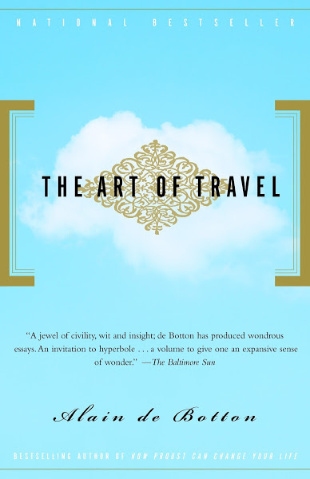At first the thought of going on a vacation is a nightmare as we think of all the details involved in planning, packing, and getting to the airport or train depot. Despite the inevitable muck-ups that happen, we usually do get to our destination only a little worse for wear.
But the demon in the dream of rest and renewal is the mind-game of expectations. We are thoroughly convinced that we need this trip and that we deserve to have perfect weather, great food, and to meet some interesting people as we see the sites and dance under the stars at night.
Alain de Botton was born in Zurich in 1969 and graduated from Oxford with a double major in history and philosophy. He founded the School of Life in 2008 and is now a creative and thoughtful spokesperson for lifelong learning. In The Art of Travel, he shares a series of essays on the ambivalent feelings he has about travel, despite the fact that it is the world's largest industry.
It doesn't take de Botton long to reach the same conclusion as we have: "The pleasure we derive from journeys is perhaps dependent more on the mindset with which we travel than on the destination we travel to." After arriving in Barbados with its wonderful beaches and paradisical setting, de Botten finds himself anxious about things he didn't get done before he left. And instead of savoring a fine meal he has an argument with his companion in the restaurant, which shatters the expectations that both of them had for the trip. Lucky for them and for us, tomorrow is another day when they can get more into the positive swing of things.
De Botton turns to painters such as Van Gogh and Ruskin to help us see the world with fresh eyes. The persnickety author shares his responses to travel books, the habits of tourists, and the small pleasures that come when we least expect them. Here is one of those moments for him:
"If we find poetry in the service station and motel, if we are drawn to the airport or train carriage, it is perhaps because, in spite of their architectural compromises and discomforts, in spite of their garish colors and harsh lighting, we implicitly feel that these isolated places offer us a material setting for an alternative to the selfish ease, the habits and confinements of the ordinary, rooted world."
Not only does de Botton find beauty in a service station, he ends up visiting an English couple who have spent years only taking trips to the places near their home. Their enthusiasm and curiosity appeal to the author and they prove that there are countless ways to savor the art of travel. One size does not fit all.
